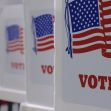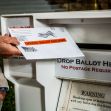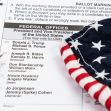With concerns regarding COVID-19, there has been discussion of giving people the option to mail in ballots instead of going in person to vote. Forty-six states are providing some form of mail-in voting. Twenty-four of these states have a Democratic governor, and 22 of these states have a Republican governor, making the split pretty even. The four states that are not providing mail-in options are states with Republican governors.
One state that has decided to provide the option of mail-in voting is New Jersey. The Governor of New Jersey, Phil Murphy, is a Democrat who has decided to mail ballots to all citizens in New Jersey and also provide the option to vote in-person. The Trump campaign has filed a lawsuit in the U.S. District Court of New Jersey to make this voting method invalid.
Texas is one of the four states against the use of mail-in voting. Texas Attorney General Ken Paxton has said that "fear of contracting COVID-19 does not amount to a sickness or physical condition as required by state law." He has also said that his office will prosecute for voter fraud anyone who votes improperly.
New Jersey already used mail-in voting for its primaries in July. For the election in November, it plans to use similar methods with some minor adjustments. Regarding in-person voting, Governor Murphy said, "We're going to have more presence of secure drop boxes, make sure there is that physical in-voting capacity." If voters decide to vote in person, they will need to use paper ballots instead of a voting machine. This method will help prevent duplicate votes.
It is estimated that about 70 percent of ballots cast in November will be sent through the mail. The American public's view on mail-in voting is extremely positive, with 70 percent saying that if people want to vote by mail, then they should be able to do so. Forty-nine percent of Republicans polled said they approve of mail-in ballots. In states where mail-in voting is already established, Republican support increases to almost 70 percent.
Experts say that fraud with mail-in voting is a bit more common than in-person voting, but not by a significant amount. In the past 20 years, about 250 million mail-in votes have been cast, and there have been only 143 criminal convictions for voter fraud regarding mail-in ballots within that time. This statistic means that there is, on average, about one conviction per state every six or seven years, or a fraud rate of 0.00006%.
Also, it would be especially difficult to counterfeit paper ballots, such as mail-in ballots. According to Jennifer Morrell, an election consultant and former local elections official in Utah and Colorado, "Ballots are built unique for each election. Each jurisdiction will normally have dozens to hundreds of unique ballot styles. Proofs for each ballot style are reviewed and tested to ensure the ballot scanners will read those ballots and only those ballots." She also said, "Even ballots created on that system from a previous election cannot be read." Or, as Colorado elections director Judd Choate said, "It's preposterous to the point of humor."
Election officials are skeptical regarding whether mail-in voting could be made accessible to more voters in time for the November elections, especially in those states that are only used to sending out a small number of mail-in ballots. Making these kinds of changes to the voting process can take years, even decades. Also, the private companies that make paper ballots might not be able to keep up with the increase in demand. "We cannot gear up, we cannot build equipment fast enough if you wait until July to place your orders," said Kevin Runbeck, CEO of Runbeck Election Services, a ballot printing company.
This November is gearing up to be one of the most significant, unique and potentially controversial presidential elections in U.S. history. Hopefully, proper procedures will be put in place to enable citizens to vote in confidence and safety with no reservations about accepting the outcome of the election, whatever it may be.






